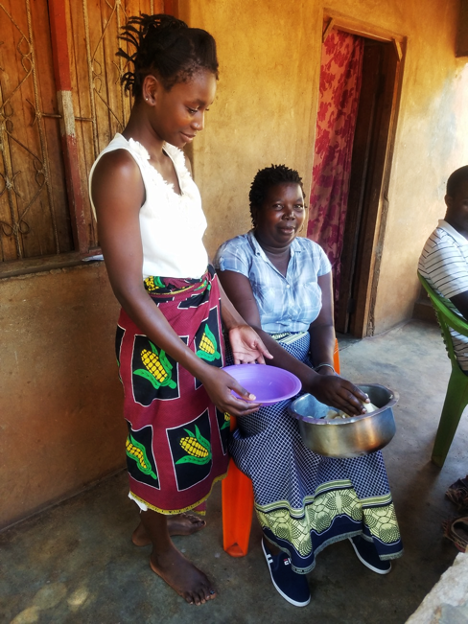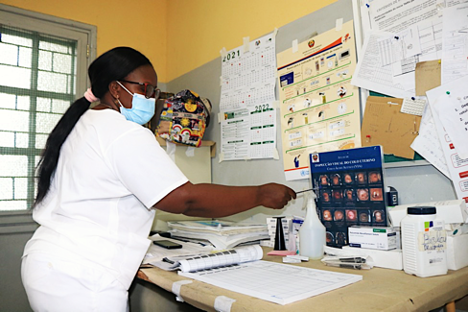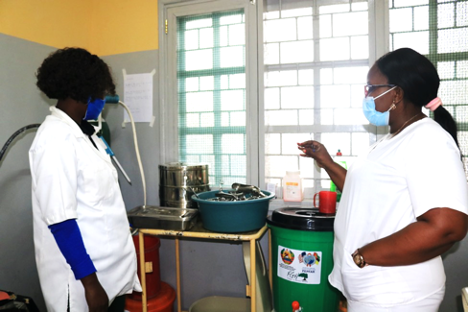
“I had been feeling bad. In December 2020, FGH took me to Mocuba (District Hospital) where I had the cervical cancer screening done. The result came back positive.”
After receiving a positive cervical cancer screening test result, Teresa Manuel S. Pinto commenced cervical cancer treatment. Teresa’s situation is representative of the reality for many Mozambican women. Invasive cervical cancer is the most prevalent cancer in Mozambican women (31% of all female cancers). And, according to UNAIDS [1], cervical cancer is the most prevalent cancer among women living with HIV. A woman living with HIV is up to five times more likely to develop invasive cervical cancer compared to a woman without HIV. If not treated, cervical cancer can lead to significant morbidity and mortality. Yet, if detected early, cervical cancer is treatable and has high treatment success rates. Bernardete Bernardo Segundo, Director of the 24 de Julho Health Facility, emphasizes “When diagnosis is made early, it is less likely serious illness will develop, and the easier the treatment will be.”

Cervical cancer screening and treatment are not always available in Mozambique’s Health Facilities. Ideally, cervical cancer would be screened through a Pap smear, which represents the gold standard for cervical cancer screening. Yet, Pap smears require proper laboratories and skilled practitioners to not only perform the test but also to read/interpret the results. For this reason FGH, following Ministry of Health guidance, has been working with the Provincial Health Directorate to introduce and expand Visual Inspection with Acetic Acid (VIA) services as a sustainable alternative to the Pap smear. VIA is used as a low-cost visual inspection cervical screening, which is performed by rubbing acetic acid on the cervix and can be done by a trained healthcare professional. VIA is considered to be as effective as a Pap smear, with the advantages of having the result and treatment performed during the same visit, as women do not need to wait for the results and return later for a consultation, thus diminishing financial burden to patients and improving treatment outcomes.
Having been initiated on cervical cancer treatment, Teresa recalls that “Before receiving cervical cancer treatment, my life was not going well. I was really bad off. I was bleeding, I couldn't sleep, my spine and my bladder hurt, I couldn't cultivate my field, I couldn't wash my clothes.”
As a result of the treatment, she says that “Now I am comfortable, I have no problems. The problem of cervical cancer is gone. (…) If it weren't for FGH I would have lost my life.”

From October 2020 to March 2021, more than 26,000 HIV-positive women underwent cervical cancer screening with FGH assistance, representing a 37% increase when compared to the previous reporting period (April to September 2020). 1,075 (80%) eligible women eligible received cryotherapy treatment . These results represent an important improvement from the last reporting period (April to September 2020) when only 48% of the women with a positive screening received cryotherapy.
Through the Avante Program, FGH is working to address barriers that inhibit women from receiving cryotherapy treatment: they enable transportation for women who are diagnosed at peripheral Health Facilities where cryotherapy equipment is not available, they are expanding the availability of cryotherapy equipment and ensuring that cryotherapy equipment is functional. FGH also supports health communication activities that aim to change social/cultural norms including the need for women to obtain their husband’s permission to undergo the procedure.
The Avante Program is funded by PEPFAR through the Centers for Prevention and Disease Control (CDC) and seeks to control the HIV epidemic by supporting the sustainable implementation of HIV and TB services in the province of Zambézia. The Avante Program is implemented by FGH, an NGO affiliated with Vanderbilt University Medical Center that works in partnership with the Government of Mozambique at the national, provincial, district, Health Facility, and community levels. FGH has been working in Zambézia Province since 2006.